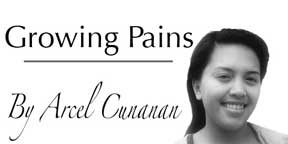Growing Pains: Part Three
 Immediately after my mom’s major surgery, my family and I scurried off to see her despite her anesthetic overload. We piled ourselves into the tiny room as she laid there, groggy from battling for her precious life.
Immediately after my mom’s major surgery, my family and I scurried off to see her despite her anesthetic overload. We piled ourselves into the tiny room as she laid there, groggy from battling for her precious life.
I softly said, “Hi mom” as my eyes began to water. My uncle asked, “Are you okay?” No answer. Instead, she flipped us off. It was all so bittersweet. As her second middle finger went up, I knew she didn’t leave me. That was her signal to let us know she was going to be fine.
We nervously laughed while apprehensively agreeing that she was okay and nothing has changed. After all, giving people the middle finger was a thing she often did. Little did we know, she wasn’t going to be the same, and neither were we.
It was all a dream—at least that’s what I had hoped for everyday I wake up. My mom hospital hopped from San Francisco General Hospital’s Trauma Center to the UCSF Neuro Intensive Care Unit where she spent about 20 days or more under constant supervision. She was susceptible to breathe her last breath at any unpredictable moment.
To prevent another rupture, the aneurysm had to be clipped, but before performing the surgery, the surgeons had shaved off half of her gorgeous hair. The surgeons had also inserted a shunt from inside her head to her belly to eradicate additional fluids from her brain. Because her brain had swollen up, her bone flap was removed and it protruded through the right side of her head.
Her skin was pulled back so far, a gigantic shiner paraded itself on her beautiful face. She looked very different, so the only way we could identify her was by her freshly pedicured toes sticking out of the white hospital sheets. Unfortunately, the blood that leaked to her brain caused some damage and, as a result of the stroke, the left side of her body experienced slight paralysis.
The sound of my mom’s voice was unheard for nearly two weeks as she was unable to say a single word. She used her own version of sign language to communicate with us, such as rubbing her belly when she was hungry, and we also brought paper for her to write to us which was sometimes unreadable.
When she finally had the strength to talk, the first thing she muttered was, “My ass itches and I feel like s—,” and then identified everyone in the room that witnessed this revelation.
Then, just like that, she stopped talking and returned to her not-always-clear way of communicating using her hand and chicken scratch.

Comments are closed.